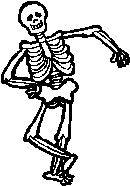
The Human Body

Summary
Students will observe and investigate the human skeletal and muscle system. Become aware of the versatility of movement provided by an articulated skeleton. Gain experiences with photographs, diagrams, and model bones to gather information. Build mechanical models to demonstrate how muscles are responsible for human movement. Compare the bones and muscles in their one body to photographs and models. Investigate response time to hands and feel. Develop an awareness of human bone and muscle structure and function and an appreciation for the versatility of the human body. Acquire the vocabulary associated with the skeletal and muscular systems. And use scientific thinking processes to conduct investigations and build explanation: observing, communicating, comparing, and organizing.
Status Grade level : 4 Time frame
4-5 weeks
Discipline
Subjects:
Science
Science, Math, Language Arts
English
Topic:
The Human Body
Print materials
FOSS Science Stories “Human Body”
FOSS Investigation worksheets
FOSS Teachers Manual
Resources
FOSS Work sheets
Internet resources links
Human Anatomy Online -
InnerBody.com
www.bbc.co.uk/science/humanbody/
http://www.innerbody.com/htm/body.html
http://medtropolis.com/VBody.asp
Standards Addressed
State: SD
Science, Language Arts
South Dakota 4th grade standards That I am using on my unit so you can go and see them.
Title: A Voyage Through the Human Body.
Understanding:
Humans struggle to understand how the human body works.
Essential Questions
How does the muscular system aid in the movement of the body?
How do muscles work?
How does the skeletal system help support the body?
How do joints help us move?
How do different systems aid in the bodies coordination?
Why is coordination important to humans?
Knowledge and Skills
Students will be able to:
Locate some of the major bones in their body.
Compare their skeleton to posters and a photo of the human skeleton.
Determine the number of bones in the human skeleton.
Explain what joints do.
Compare human skeletal joints to analogous mechanical structures.
Learn that muscles contract when they work.
Learn how muscles, ligaments, and tendons work together.
Observe the bones, joints, and muscles that move when the hand and foot respond.
Use scientific thinking process to conduct investigations and build explanations: observing,
communicating, comparing, and organizing.